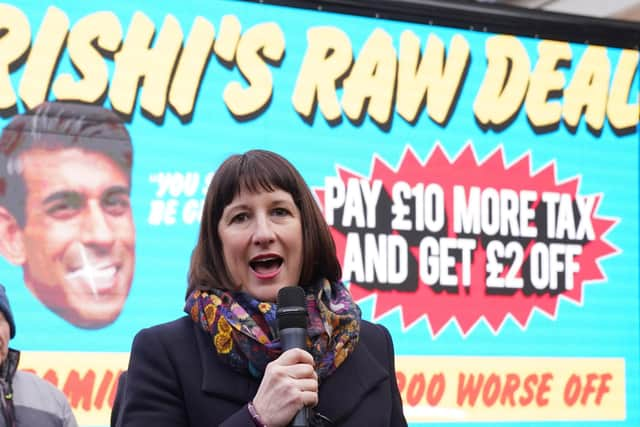Labour is tying itself in knots over pledge to spend billions on net zero - Bill Carmichael
Slippery doesn’t even begin to describe it, and just like a jelly the harder you squeeze it the more it oozes between your fingers and is impossible to pin down.
And if they are this evasive in Opposition, what are they going to be like when they finally get power?
Advertisement
Hide AdAdvertisement
Hide AdThe questions have arisen over Labour’s flagship policy, announced to great fanfare at the 2021 party conference, to spend £28bn every year until 2030 on a “green prosperity plan” in imitation of US President Joe Biden’s massive Inflation Reduction Act, that has pledged almost £400bn on new spending and subsidies to boost green energy.


The British version of this green pledge promised to hit Net Zero carbon emissions by 2030 (which is simply not going to happen), to create lots of “green jobs” (which never seem to actually appear), and to create a new state-owned power company, Great British Energy.
The Conservatives calmly and reasonably pointed out that there were only three ways in which such massive spending could be financed; by raising taxes, by cutting spending in other areas, or by increased borrowing, and in all likelihood all three would be needed.
Sadly, there is no magic money tree that can be given a shake in the Chancellor’s garden at Number 11 Downing Street.
Advertisement
Hide AdAdvertisement
Hide AdFor a while the Labour leader, Sir Keir Starmer, and his Shadow Chancellor, the Leeds West MP Rachel Reeves, managed to hold the line.
But unusually for the current Tory government, its messaging on this issue turned out to be quite effective, and more and more people began to ask the simple question: ‘Where the hell is this colossal amount of money going to come from?’
To add to Labour’s troubles, financial experts began to warn that such reckless and unfunded spending and borrowing could spook the money markets and force interest and mortgage rates higher, in the manner of the disastrous Truss-Kwarteng mini budget in 2022.
So Starmer and Reeves began backpedalling as though someone had hit the reverse button on a video of the Tour de Yorkshire.
Advertisement
Hide AdAdvertisement
Hide AdFirst Reeves said the £28bn spending target would not be reached straight away, but sometime after 2027. Then it was revealed that current spending by the Conservative government would be included in the figure.
Then came reports the target had been abandoned entirely - a claim that was denied by the party.
But the Shadow Business Secretary, Jonathan Reynolds, described it as an “ambition” rather than a firm pledge.
And in a radio phone-in this week, Reeves couldn’t even bring herself to mention the £28bn figure and instead said the spending had to be approached in a “way where the numbers add up”.
Advertisement
Hide AdAdvertisement
Hide AdShe added: “All of our policies are subject to the fiscal rules and those fiscal rules state that we will not borrow for day-to-day spending - that would be irresponsible.”
She has also promised that debt will fall as a percentage of GDP.
All this is the clearest signal yet that the £28bn figure is being junked. What was a cast-iron pledge just a few months ago is melting away like an ice cube on a sunny day.
Despite this equivocation, I like Reeves. She is a comprehensive schooled Londoner who has represented Leeds West with some distinction since 2010. She has worked as an economist for the Bank of England and was a chess champion as a child.
Advertisement
Hide AdAdvertisement
Hide AdThere have been some avoidable missteps in her career. For example she was accused of plagiarism last year when it was revealed that whole paragraphs of her book, The Women Who Made Modern Economics, had been lifted from Wikipedia.
But despite this she is clearly a talented and clever woman, and a serious politician, who could well be our first female Chancellor of the Exchequer.
And her stance against profligate spending is the only responsible approach to the nation’s finances.
The fact that she has had the courage to stand up for fiscal credibility and sound finances over overly ambitious climate change commitments is entirely to her credit.
But whether the noisy green activists in her party will see it that way is an important point. She is going to need a lot more bravery if she is to stand her ground.
Comment Guidelines
National World encourages reader discussion on our stories. User feedback, insights and back-and-forth exchanges add a rich layer of context to reporting. Please review our Community Guidelines before commenting.